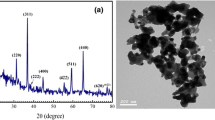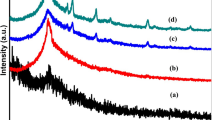Abstract
Controlling the physical properties of the functional materials is required for broadening their industrials and technological applications. High purity copper oxide (CuO) nanoparticles (NPs) of monoclinic phase and average crystallite size of 35 nm were prepared by a simple sol–gel technique. A solution casting method was applied to prepare carboxymethyl cellulose (CMC), polyvinyl alcohol (PVA)/CMC, and CuO/PVA/CMC nanocomposite films. X-ray diffraction (XRD) pattern of CMC shows a broad XRD peak around 2θ = 20.7° which is influenced by PVA and CuO NPs addition. The surface morphology and dispersion of CuO NPs in PVA/CMC films were investigated by scanning electron microscopy (SEM). CMC film shows transparency of 87 % increased after PVA addition, and then decreased with CuO NPs incorporation. The insulating properties, refractive index, and optical constants of CMC are controlled by mixing with PVA and doping with CuO NPs. In addition, the current–voltage (I–V) characteristics of the PVA/CMC blend and nanocomposite films show a non-ohmic behavior. The conduction mechanism in PVA/CMC blend is Schottky emission at low temperature, while the Poole–Frenkel effect plays an important role in CuO-doped films at high temperatures.











Similar content being viewed by others
References
Hsieh TH, Huang YS, Shen MY (2015) Mechanical properties and toughness of carbon aerogel/epoxy polymer composites. J Mater Sci 50:3258–3266. doi:10.1007/s10853-015-8897-0
Bidsorkhi HC, Adelnia H, Pour RH, Soheilmoghaddam M (2015) Preparation and characterization of ethylene-vinyl acetate/halloysite nanotube nanocomposites. J Mater Sci 50:3237–3245. doi:10.1007/s10853-015-8891-6
Arjmandi R, Hassan A, Eichhorn SJ, Haafiz MKM, Zakaria Z, Tanjung FA (2015) Enhanced ductility and tensile properties of hybrid montmorillonite/cellulose nanowhiskers reinforced polylactic acid nanocomposites. J Mater Sci 50:3118–3130. doi:10.1007/s10853-015-8873-8
Abreu AS, Oliveira M, Rodrigues PV, Moura I, Botelho G, Machado AV (2015) Synthesis and characterization of polystyrene-block-poly(vinylbenzoic acid): a promising compound for manipulating photoresponsive properties at the nanoscale. J Mater Sci 50:2788–2796. doi:10.1007/s10853-015-8835-1
Zhou L, Liu H, Zhang X (2015) Graphene and carbon nanotubes for the synergistic reinforcement of polyamide 6 fibers. J Mater Sci 50:2797–2805. doi:10.1007/s10853-015-8837-z
Thomas S, Maria HJ, Joy J, Chan CH, Pothen LA (2013) Natural rubber materials: composites and nanocomposites, vol 2. Royal Society of Chemistry, London, UK
Aziz NAN, Idris NK, Isa MIN (2009) Ionic conductivity studies of chitosan-based polymer electrolytes doped with adipic acid. Ionics 15:643–646
Samsudin AS, Isa MIN (2012) Structural and electrical properties of carboxymethyl cellulose-dedecyltrimethyl ammonium bromide-based biopolymer electrolytes system. Int J Polym Mater 61(1):30–40
Mohammed FA (2001) Topical permeation characteristics of diclofenac sodium from Na-CMC gels in comparison with conventional gel formulations. Drug Dev Ind Pharm 27(10):1083–1097
Tiitu M, Laine J, Serimaa R, Ikkala O (2006) Ionically self-assembled carboxymethyl cellulose/surfactant complexes for antistatic paper coatings. J Colloid Interface Sci 301:92–97
Roy N, Saha N, Kitano T, Saha P (2012) Biodegradation of PVP-CMC hydrogel film: a useful food packaging material. Carbohydr Polym 89:346–353
Wang M, Xu L, Hu H, Zhai M, Peng J, Nho Y, Li J, Wei G (2007) Radiation synthesis of PVP/CMC hydrogels as wound dressing. Nucl Instrum Meth B 265:385–389
Sandeep C, Harikumar SL, Kanupriya (2012) Hydrogel: a smart drug delivery system. Int J Res Pharm Chem 2:603–614
Miremadi SI, Shafiabadi N, Amini-Fazl MS (2013) Gas separation properties of cross-linked and non-cross-linked carboxymethyl cellulose (CMC) membranes. Sci Iran C 20(6):1921–1928
Ravikiran YT, Kotresh S, Vijayakumari SC, Thomas S (2014) Liquid petroleum gas sensing performance of polyaniline carboxymethyl cellulose composite at room temperature. Curr Appl Phys 14:960–964
Raafat AI, Eid M, El-Arnaouty MB (2012) Radiation synthesis of superabsorbent CMC based hydrogels for agriculture applications. Nucl Instrum Meth B 283:71–76
Magasinski A, Zdyrko B, Kovalenko I, Hertzberg B, Burtovyy R, Huebner CF, Fuller TF, Luzinov I, Yushin G (2010) Toward efficient binders for Li-Ion battery Si-based anodes: polyacrylic acid. ACS Appl Mater Interfaces 2:3004–3010
Lee J, Bhttacharryya D, Easteal AJ, Metson JB (2008) Properties of nano-ZnO/poly(vinyl alcohol)/poly(ethylene oxide) composite thin films. Curr Appl Phys 8:42–47
Abdel-Kader FH, Shehap AM, Abellil MS, Mahmoud KH (2005) Relaxation phenomenon of poly(vinyl alcohol)/sodium carboxymethyl cellulose blend by thermally stimulated depolarization currents and thermal sample technique. J Appl Polym Sci 95:1342–1352
Abou Taleb MF, Abd El-Mohdy HL, Abd El-Rehim HA (2009) Radiation preparation of PVA/CMC copolymers and their application in removal of dyes. J Hazard Mater 168:68–75
El Salmawi KM (2007) Application of polyvinyl alcohol (PVA)/carboxymethyl cellulose (CMC) hydrogel produced by conventional crosslinking or by freezing and thawing. J Macromol Sci, Pure Appl Chem 44:619–624
Rozali MLH, Isa MIN (2014) Electrical behaviour of carboxymethyl cellulose doped adipic acid solid biopolymer electrolyte. Int J Mater Sci 4:59–64
El-Saied H, Basta AH, Hanna AA, El-Sayed AM (1999) Some semiconductor properties of carboxymethyl cellulose-copper complexes. Polym-Plast Technol 38:1095–1105
Hafiza MN, Isa MIN (2014) Ionic conductivity and conduction mechanism studies of CMC/chitosan biopolymer blend electrolytes. Res J Recent Sci 3:50–56
Zhu C, Chen J, Koziol K, Gilman JW, Trulove PC, Rahatekar SS (2014) Effect of fibre spinning conditions on the electrical properties of cellulose and carbon nanotube composite fibres spun using ionic liquid as a benign solvent. Express Polym Lett 8:154–163
El-Bahy ZM, Mahmoud KH (2012) Dielectric characterization and catalytic activity studies of nickel chloride doped carboxymethyl cellulose films. Spectrochim Acta A 92:105–112
Abdel-Galil HE, Atta AA, Balboul MR (2014) Influence of nanostructured TiO2 additives on some physical characteristics of carboxymethyl cellulose (CMC). J Radiat Res Appl Sci 7:36–43
Yadava M, Rhee KY, Park SJ (2014) Synthesis and characterization of graphene oxide/carboxymethyl cellulose/alginate composite blend films. Carbohydr Polym 110:18–25
Zhang H, Zhai D, He Y (2014) Graphene oxide/polyacrylamide/carboxymethyl cellulose sodium nanocomposite hydrogel with enhanced mechanical strength: preparation, characterization and the swelling behavior. RSC Adv 4:44600–44609
Rathod SG, Bhajantri RF, Ravindrachary V, Sheela T, Pujari PK, Naik J, Poojary B (2015) Pressure sensitive dielectric properties of TiO2 doped PVA/CN-Li nanocomposite. J Polym Res 22:6
Mugwang’a FK, Karimi PK, Njoroge WK, Omayio O, Waita SM (2013) Optical characterization of copper oxide thin films prepared by reactive dc magnetron sputtering for solar cell applications. Int J Thin Film Sci Technol 2:15–24
Ganga BG, Santhosh PN (2014) Manipulating aggregation of CuO nanoparticles: correlation between morphology and optical properties. J Alloys Compd 612:456–464
Chaudhary YS, Agrawal A, Shrivastav R, Satsangi VR, Dass S (2004) A study on the photoelectrochemical properties of copper oxide thin films. Int J Hydrogen Energ 29:131–134
Zhang Q, Zhang K, Xu D, Yang G, Huang H, Nie F, Liu C, Yang S (2014) CuO nanostructures: synthesis, characterization, growth mechanisms. Fundamental properties and applications. Prog Mater Sci 60:208–337
Zhang YX, Huang M, Li F, Wen ZQ (2013) Controlled synthesis of hierarchical CuO nanostructures for electrochemical capacitor electrodes. Int J Electrochem Sci 8:8645–8661
Liu Y, Liao L, Li J, Pan C (2007) From copper nanocrystalline to CuO nanoneedle array: synthesis, growth mechanism, and properties. J Phys Chem C 111:5050–5056
Zhu H, Zhao F, Pan L, Zhang Y, Fan C, Zhang Y, Xiao JQ (2007) Structural and magnetic properties of Mn-doped CuO thin films. J Appl Phys 101:09H111
Vidyasagar CC, Naik YA, Venkatesh TG, Viswanatha R (2011) Solid-state synthesis and effect of temperature on optical properties of Cu–ZnO, Cu–CdO and CuO nanoparticles. Powder Technol 214:337–343
Hill KM (1971) Poole-Frenkel conduction in amorphous solids. Philos Mag 23:59–86
Caserta G, Rispoli B, Serra A (1969) Space-charge-limited current and band structure in amorphous organic films. Phys Stat Sol A 35:237–248
Perets YS, Matzui LY, Vovchenko LL, Prylutskyy YI, Scharff P, Ritter U (2015) The effect of boron nitride on electrical conductivity of nanocarbon-polymer composites. J Mater Sci 49:2098–2105. doi:10.1007/s10853-013-7901-9
Sinha S, Chatterjee SK, Ghosh J, Meikap AK (2015) Electrical transport properties of polyvinyl alcohol–selenium nanocomposite films at and above room temperature. J Mater Sci 50:1632–1645. doi:10.1007/s10853-014-8724-z
Makhlouf SA, Bakr ZH, Aly KI, Moustafa MS (2013) Structural, electrical and optical properties of Co3O4 nanoparticles. Superlattices Microst 64:107–117
Singh I, Bedi RK (2011) Studies and correlation among the structural, electrical and gas response properties of aerosol spray deposited self assembled nanocrystalline CuO. Appl Surf Sci 257:7592–7599
Lu Y, Zhang N, Zhao Q, Liang J, Chen J (2015) Micro-nanostructured CuO/C spheres as high-performance anode materials for Na-ion batteries. Nanoscale 7:2770–2776
Chand P, Gaur A, Kumar A (2013) Structural, optical and ferroelectric behavior of CuO nanostructures synthesized at different pH values. Superlatt Microst 60:129–138
Luna-Martinez JF, Hernandez-Uresti DB, Reyes-Melo ME, Guerrero-Salazar CA, Gonzalez-Gonzalez VA, Sepulveda-Guzman S (2011) Synthesis and optical characterization of ZnS–sodium carboxymethyl cellulose nanocomposite films. Carbohydr Polym 84:566–570
Grumezescu AM, Andronescu E, Ficai A, Bleotuc C, Mihaiescu DE, Chifiriuc MC (2012) Synthesis, characterization and in vitro assessment of the magnetic chitosan–carboxymethyl cellulose biocomposite interactions with the prokaryotic and eukaryotic cells. Int J Pharm 436:771–777
Agarwal R, Alam MS, Gupta B (2013) Polyvinyl alcohol-polyethylene oxide-carboxymethyl cellulose membranes for drug delivery. Appl Polym Sci 129:3728–3736
Hassen A, El Sayed AM, Morsi WM, El-Sayed S (2012) Influence of Cr2O3 nanoparticles on the physical properties of polyvinyl alcohol. J Appl Phys 112:093525
Ali AI, Ammar AH, Abdel Moez A (2014) Influence of substrate temperature on structural, optical properties and dielectric results of nano-ZnO thin films prepared by Radio Frequency technique. Superlattices Microst 65:285–298
Abd Alla SG, Said HM, El-Naggar AM (2004) Structural properties of γ-irradiated poly (vinyl alcohol)/poly (ethylene glycol) polymer blends. J Appl Polym Sci 94:167–176
Mallakpour S, Madani M (2011) Use of l-tyrosine amino acid as biomodifier of Cloisite Na+ for preparation of novel poly(vinyl alcohol)/organoclay bionanocomposites film. J Mater Sci 46:4071–4078. doi:10.1007/s10853-011-5336-8
El Sayed AM (2014) Synthesis and controlling the optical and dielectric properties of CMC/PVA blend via γ-rays irradiation. Nucl Instrum Meth B 321:41–48
El Sayed AM, Morsi WM (2014) α-Fe2O3/(PVA + PEG) Nanocomposite films; synthesis, optical, and dielectric characterizations. J Mater Sci 49:5378–5387. doi:10.1007/s10853-014-8245-9
Chang PR, Yu J, Ma X (2009) Fabrication and characterization of Sb2O3/carboxymethyl cellulose sodium and the properties of plasticized starch composite films. Macromol Mater Eng 294:762–767
Deng C, Hu H, Zhu W, Han C, Shao G (2011) Green and facile synthesis of hierarchical cocoon shaped CuO hollow architectures. Mater Lett 65:575–578
Abdelaziz M (2011) Cerium (III) doping effects on optical and thermal properties of PVA films. Phys B 406:1300–1307
El Sayed AM, Morsi WM (2013) Dielectric relaxation and optical properties of polyvinyl chloride/lead monoxide nanocomposites. Polym Compos 34:2031–2039
El Sayed AM, El-Sayed S, Morsi WM, Mahrous S, Hassen A (2014) Synthesis, characterization, optical, and dielectric properties of polyvinyl chloride/cadmium oxide nanocomposite films. Polym Compos 35:1842–1851
Al-Ghamdi AA (2006) Optical band gap and optical constants in amorphous Se96-xTe4Agx thin films. Vacuum 80:400–405
Lampman S (2003) Characterization and failure analysis of plastics. ASM International, Ohio
Suzuki K, Tanaka N, Ando A, Takagi H (2012) Size-selected copper oxide nanoparticles synthesized by laser ablation. J Nano Part Res 14:863–874
Diaham S, Locatelli ML (2012) Concentration and mobility of charge carriers in thin polymers at high temperature determined by electrode polarization modeling. J Appl Phys 112:013710
Li Q, Xue QZ, Gao XL, Zheng QB (2009) Temperature dependence of the electrical properties of the carbon nanotube/polymer composites. Express Polym Lett 3:769–777
Nagaraj N, Reddy ChVS, Sharma AK, Rao VVRN (2002) DC conduction mechanism in polyvinyl alcohol films doped with potassium thiocyanate. J Power Sour 112:326–330
Abdel-Malik TG, Abdel-Latif RM, Sawaby A, Ahmed SM (2008) Electrical properties of pure and doped polyvinyl alcohol (PVA) films using gold and aluminum electrodes. J Appl Sci Res 4:331–336
Bronsgeest M (2014) Physics of Schottky electron sources: theory and optimum operation. CRC Press, Boca Raton
Pillai PKC, Jain K, Jain VK (1973) Thermally stimulated discharge current studies in shellac wax electrets. Phys Stat Sol A17:221–227
Author information
Authors and Affiliations
Corresponding author
Rights and permissions
About this article
Cite this article
El Sayed, A.M., El-Gamal, S., Morsi, W.M. et al. Effect of PVA and copper oxide nanoparticles on the structural, optical, and electrical properties of carboxymethyl cellulose films. J Mater Sci 50, 4717–4728 (2015). https://doi.org/10.1007/s10853-015-9023-z
Received:
Accepted:
Published:
Issue Date:
DOI: https://doi.org/10.1007/s10853-015-9023-z




